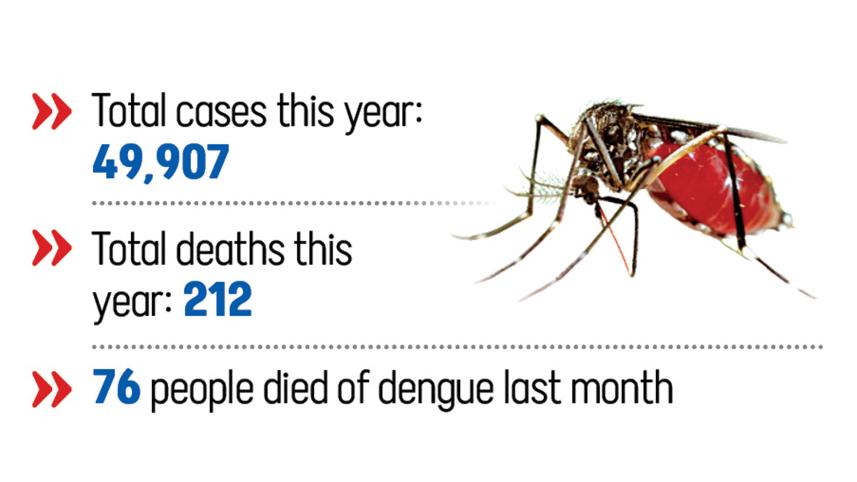Dengue outbreak: 9 dead, over 1,000 cases in one day

At least 1,042 new dengue cases were reported yesterday -- the highest in a single day this year -- taking the confirmed number to nearly 50,000 so far.
Nine people died from the Aedes mosquito-borne disease yesterday, the second highest single-day toll this year. With them, the total death count is now 212, according to the Directorate General of Health Services (DGHS). Bangladesh saw its deadliest day of the year on September 21, when dengue claimed 12 lives, the highest single-day death toll recorded so far.
As of yesterday, 49,907 people have been hospitalised with dengue this year. Last month alone, 15,866 were infected and 76 died. In just the first five days of this month, 2,565 new cases and 14 deaths have already been reported.
Experts have warned that cases and fatalities will rise sharply if urgent measures are not taken.
HM Nazmul Ahsan, associate professor at Shaheed Suhrawardy Medical College Hospital, told The Daily Star that patient numbers have risen steeply in the past week.
"We started operating a separate ward in the hospital about eight days ago. Just a day earlier, we had 29 patients there, but the number nearly doubled to 60 today. Most are admitted in critical condition."
He mentioned that most patients arrive with low blood pressure and symptoms of shock, particularly those who deteriorate after their fever subsides.
"The 48 hours after recovery from fever is the most critical period, requiring close monitoring. If IV fluids are not administered on time, the condition worsens, and those who arrive late are often the ones who die."
A DGHS statement yesterday said seven of the nine victims died on the day of hospitalisation. Primarily, the delay in reaching hospital or consulting doctors makes the dengue infection complicated, it added.
On the virus strain, Nazmul said, "We don't have proper sero-surveillance, so we cannot confirm the exact reason. But if the Den-2 serotype remains dominant, severity and fatalities will remain high."
The dengue virus has four serotypes -- Den-1, Den-2, Den-3, and Den-4. Last year, around 70 percent of infections were linked to Den-2.
He also recommended early admission for high-risk groups such as the elderly, pregnant women, and people with comorbidities. He advised those under home care to drink plenty of fluids, including oral saline, coconut water, rice starch, soups, and fresh fruit juices.
Public health expert Mohammad Mushtuq yesterday said the rising number of patients will overwhelm large hospitals.
"In major hospitals, all services are available, but beds -- including ICU beds -- are limited. Dealing with critical patients becomes impossible if we don't decentralise services."
He questioned why patients are not being directed to other healthcare facilities.
"If this is not addressed, even if you bring in more doctors, it won't work. Patients will end up being treated on the floor, beside bathrooms. This is not acceptable."
He urged the government to strengthen primary and secondary healthcare facilities to build public trust. "Right now, people feel they don't get proper care there, so they rush to Dhaka Medical College Hospital. But Dhaka Medical cannot take everyone. Overcrowding makes proper clinical care almost impossible."
The health expert emphasised that decentralising both clinical and diagnostic services is urgent. "People should have access to dengue tests at little or no cost. This will reduce the burden of patients on major hospitals."
Prof Kabirul Bashar, an entomologist at Jahangirnagar University, said, "Dengue comes in waves. When mosquito density is high, it becomes very difficult to stop the spread of dengue. Our forecasting model shows that cases will peak in October, start to decline in November, but continue significantly until January."
He stressed that while city corporations must intensify source reduction, breeding-site management, hotspot control, and other measures, everyone must also work from their own position.




 For all latest news, follow The Daily Star's Google News channel.
For all latest news, follow The Daily Star's Google News channel.
Comments